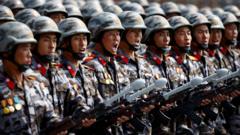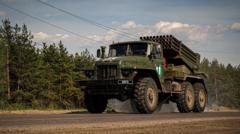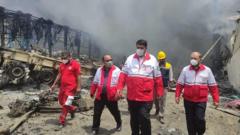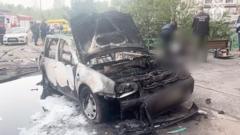Recent analyses highlight an alarming death toll among Russian forces in Ukraine, with over 95,000 confirmed fatalities. Many soldiers, particularly from the self-proclaimed Donbas republics and prisons, face hidden losses, impacting societal perceptions of the conflict.
Unseen Sacrifices: The Hidden Death Toll of Russian Forces in Ukraine

Unseen Sacrifices: The Hidden Death Toll of Russian Forces in Ukraine
As the war in Ukraine continues, tens of thousands of Russian fighters remain unrecognized, leading families to grieve in silence.
The ongoing conflict in Ukraine has evolved into a grim chapter of hidden sacrifices, as over 95,000 Russian combatants are estimated to have perished since the war's inception in 2022, according to a BBC analysis. This figure notably omits those killed while serving in self-proclaimed Donbas militias, which may account for an additional 21,000 to 23,500 losses. The comprehensive tally draws upon data collated from official records, media reports, and social memorials but is believed to only scratch the surface of actual fatalities.
Among these untold stories is Daniil Dudnikov, a 21-year-old history student at Donetsk National University mobilized against his will as the conflict escalated. His fate mirrors many others from the Donbas and Luhansk regions, where local men were drafted under duress, often with inadequate training and equipment. Many soldiers, like Daniil, went missing shortly after deployment, never to be accounted for.
This lack of visibility surrounding the losses is compounded for those from the Donbas, as their connections to Russia diminish due to their geographic and social isolation. Moreover, a considerable proportion of casualties stem from convicts recruited from Russian prisons. Ildus Sadykov, imprisoned for theft, joined the frontlines under threat of returning to jail. His tragic death in combat illustrates the precarious circumstances of those coerced into military service.
Gulnaz Sharafutdinova, an expert from King's College London, emphasizes that the socio-economic background of soldiers impacts how losses resonate within Russian society. Generally, casualties are more felt in communities with fewer resources, while higher social classes maintain a distance from the conflict, further perpetuating a cycle of invisibility.
Public awareness of the war's toll is severely lacking; a poll revealed that only 30% of Russians have a direct connection to the conflict, compared to 80% of Ukrainians who know someone affected. This contributes to a difficult landscape for gauging genuine sentiment towards the war in Russia, where citizens might fear expressing honest opinions.
Estimates suggest that actual military losses could be much higher than reported, with military analysts indicating the BBC's research reflects only 45% to 65% of true fatalities. As bodies remain unretrieved on battlegrounds, total Russian military deaths may range from 146,194 to as high as 211,169. Recently, Russia ceased officially reporting its military losses, with the last figure reported being fewer than 6,000 casualties in September 2022.
While attention gradually shifts to potential peace negotiations, the toll and stories of those fighting in Ukraine remain obscured. As the conflict nears its fourth year, the urgency to recognize and address these hidden losses will continue to shape the narrative surrounding the war.





















